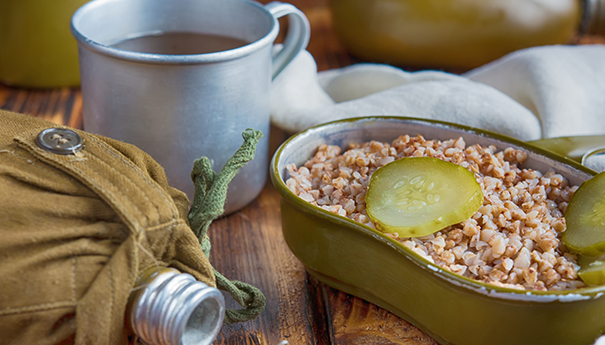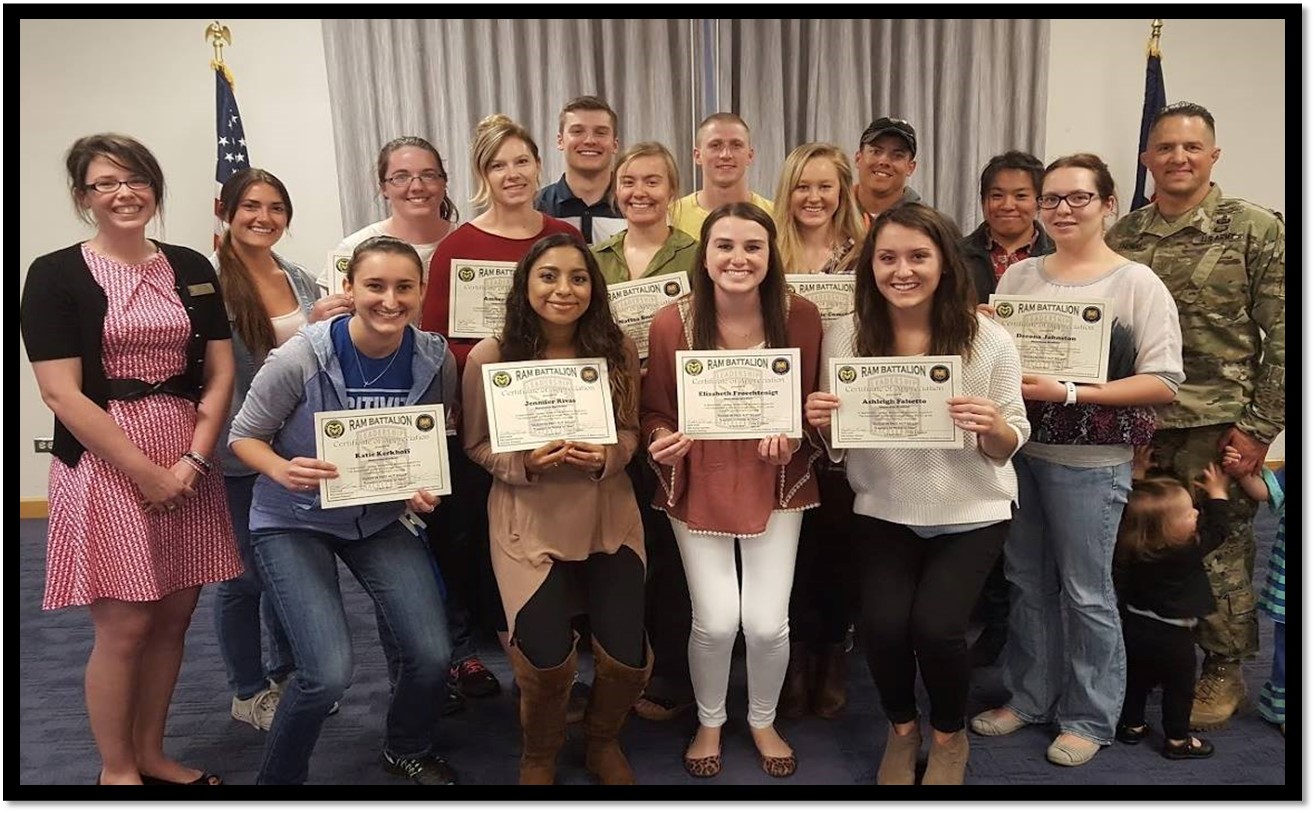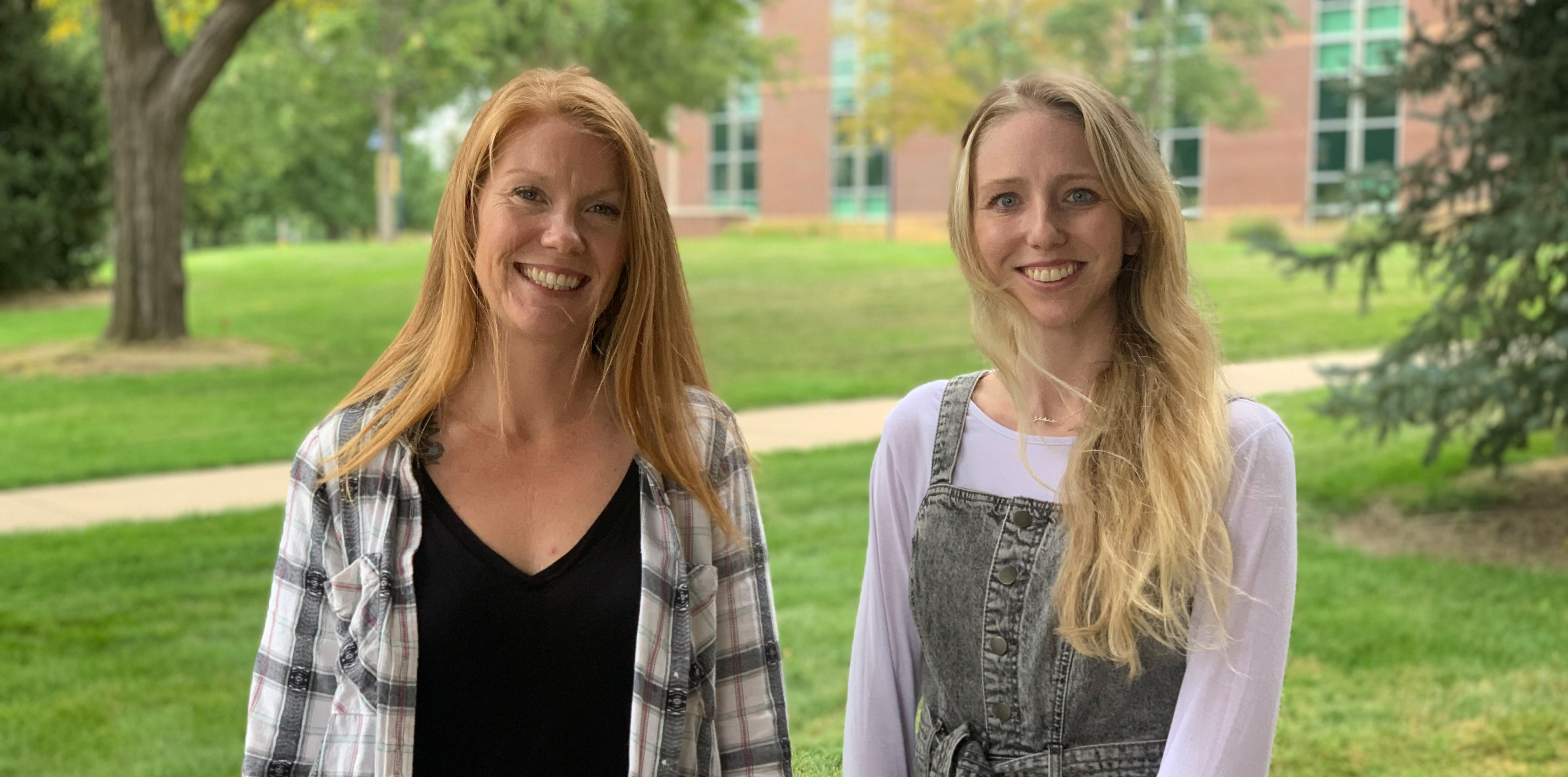
The University of Northern Colorado’s Army ROTC program is receiving diet and nutrition support from the UNC Department of Nutrition and Dietetics. Headed by Assistant Professor of Nutrition and Dietetics Katie Kage, Ph.D., UNC is at the forefront of undertaking such a project nationwide.
“From my knowledge, no other university in the country is doing something like this,” said Kage. “The program might be something we can package and showcase to other universities saying, ‘This is what we’re doing, how can we get it out to you guys and adjust it for you?”
The initiative started three years ago when an Army ROTC cadet contacted Kage about the need to increase his cadets’ nutritional knowledge. Each year since, Kage has tested the cadets’ knowledge on nutrition, and each time the results were surprising: A 100-percent failure.
 Above: The ending ceremony of the program’s first year showing most of the UNC Army ROTC
cadets and the 1st year ending ceremony that shows most of the cadets and the Department
of Nutrition and Dietetics students that participated along with Katie Kage, Ph.D.
(far left) and LTC Troy Thomas (far right).
Above: The ending ceremony of the program’s first year showing most of the UNC Army ROTC
cadets and the 1st year ending ceremony that shows most of the cadets and the Department
of Nutrition and Dietetics students that participated along with Katie Kage, Ph.D.
(far left) and LTC Troy Thomas (far right).
Most people believe they know what’s best for them in terms of nutrition, but there are many misconceptions out there, she said. This is proof that “these individuals need some help, and we have the support on campus to provide it to them.”
After the project’s first semester, Kage decided to pair up Army ROTC cadets with senior-level students in the UNC Department of Nutrition and Dietetics to benefit both sides.
“They get to work together throughout the year on individual counseling, grocery store tours, cooking demos and whatever’s needed for the cadet,” Kage said. “Our students get to practice skills in a real-life setting while still in the safety net of the university and my guidance; it’s a good confidence builder.”
UNC alumna Kiera Papish BS-15 advised a female cadet during the 2016-17 school year while completing courses to qualify for a dietetic internship. She met with the cadet once a month in person and once a week through email to touch base on the cadet’s short- and long-term goals. Her goals related to weight loss, muscle gain and her perceived effort in running a timed one-mile while also learning “how to eat better in order to train better.”
“This program would be helpful for dietetics students across the country as it gives students the chance to practice skills they are learning in the classroom in an independent setting with peers,” Papish said. “It’s great that this program is able to teach young cadets how to eat healthfully and the effect it has on their performance, so they can use that knowledge from college throughout their lifetime.”
When Army ROTC students graduate, they immediately become officers in the Army. The goal is to create a “ripple effect” where they’ll immerse soldiers under their command with learned nutritional knowledge.
Lt. Col. Thomas Troy, a military history professor at Colorado State University who heads the Army ROTC programs at both universities, sees great value in this program especially in strengthening national defense.
“It’s an opportunity for young cadets to start thinking about how important nutrition is,” Troy said. “It makes me very happy that [Kage] sees the long-term benefit for not only the individuals, but for the nation as a whole: healthy and young recruits are important, so we can continue to place people in the military and keep a strong defense.”
UNC’s Air Force ROTC has expressed interest in wanting their cadets to go through Kage’s program, as well.
“It might be the next step [in this program] to do the same testing with them and see if they have the same needs in terms of nutritional education,” she said. “If so, then we can include them in the program and help make sure all military cadets on campus are getting the nutrition resources needed.”
—Written by Katie-Leigh Corder
More Stories
-
Alumna Receives NSF Graduate Fellowship for Avian Conservation Research
Este artículo no está en español.
-
Novel and Interdisciplinary Research on Transgender Health
Este artículo no está en español.
-
Grad Students Researching Methods to Strengthen Mental Health Training in Rural Schools
Este artículo no está en español.
-
Doctoral Students Present Dissertation Projects in Three-Minute Competition
Este artículo no está en español.





